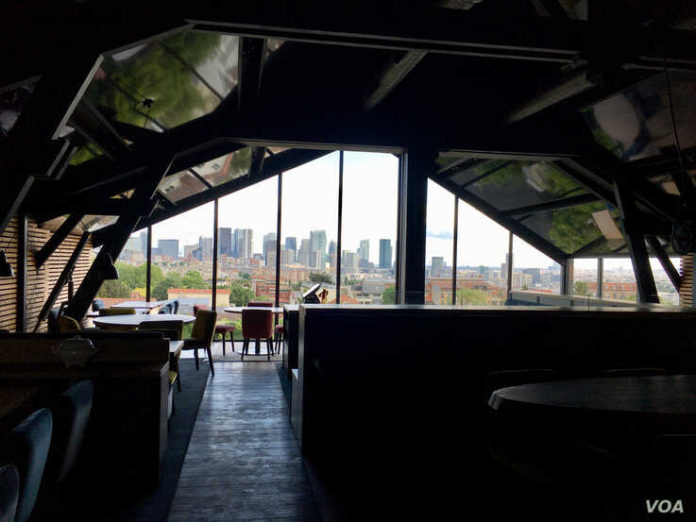RUEIL-MALMAISON, FRANCE – It’s mid-rush hour, culinarily speaking, at Sapristi restaurant outside Paris. Cooks are dicing onions, stirring sausage, slicing tuna in slender chunks, their work spare and clean.
Head chef Gilbert Benhouda ticks off the menu du jour: pasta with tuna and capers; sautéed chicken with mushrooms and parsley; roast sausage and potatoes.
“Today, we’re producing 1,300 meals,” he says. “That’s enough for three days.”
The chefs are not cooking for their usual clientele, but rather the frazzled ranks of coronavirus responders. Their mandatory face masks and bottles of hand sanitizer—not to mention the empty tables just outside the kitchen door—underscore the grim new world facing France’s restaurant industry.
As the country begins emerging from a two-month lockdown next week, Sapristi and other restaurants will stay closed.
“We’re not dead, we’re not alive, we’re in the middle—in artificial coma,” says Hakim Gaouaoui, owner of Les Bistrots Pas Parisiens restaurant chain that includes Sapristi.
Across Europe, the coronavirus has shuttered thousands of eating establishments, dealing them a multi-billion-dollar blow. And while a handful of countries, including Germany and the Netherlands, have announced plans for reopening eateries, the pandemic is shaping a radically different dining experience, at least in the near future.
Economic hit
Few places feel the impact more keenly than France, where gastronomy is embedded in its heritage. A recent survey finds nearly two-thirds of French go to restaurants at least once a month. Now, industry experts fear the pandemic could drive up to one-third of establishments out of business.
If they go under, they risk bringing down other businesses with them, including food deliveries and small farmers.
“We deliver to more than 200 restaurants,” says fruit and vegetable supplier Murat Can. “Whether we work or not, we need to pay more than 200,000 euros ($216,000) in monthly charges.”
In an open letter published in Le Figaro newspaper last month, more than a dozen top chefs appealed to President Emmanuel Macron for an immediate reopening, warning that otherwise “many of us risk not getting back on our feet.”
Some are now taking Gaouaoui’s route—rolling out pro-bono efforts and stop-gap measures to stay in the news and afloat.
On a recent Saturday morning, Benhouda and fellow chef Yoanne Flament loaded up a car with bins of vacuum-packed meals cooked up in Sapristi’s kitchen.
The first distribution destination: Hospital Foch in Suresnes, just west of Paris.
“We’ve had these meals since the beginning of the epidemic,” says the hospital’s deputy director, Floriane de Dadelsen, praising Gaouaoui’s chain and others for “real solidarity.”
At a police station a few kilometers away, officers welcomed the chefs with smiles, plying them with coffee and waving goodbye as they drove off.
Launched shortly after France’s lockdown began in March, Gaouaoui’s new charity now delivers roughly 3,500 meals a week to hospital staff, police, firefighters and garbage collectors. The restaurant chain has bankrolled $60,000 of the cost and raised another $11,000 in private donations.
“We want to get people to talk about us, to realize we’re not just sitting home and doing nothing,” Benhouda says. “And we’re hoping people will remember us when we’re ready to reopen.”
Keeping gastronomy alive
Another Sapristi staffer, Denis Janvier, said he volunteered his cooking services as a “civic duty.” Outside of that, he’s holed up in his Paris apartment “being careful with money.”
For now, the French government is picking up much of the tab for idled restaurant workers. Even so, the lockdown is hitting the industry hard. Gaouaoui estimates his chain is losing more than $100,000 a day.
It’s a steep slide for the entrepreneur of Algerian origin, who began his career at 18 delivering pizza. Today, Gaouaoui is considered the ultimate French success story, with a chain of nearly a dozen restaurants. In 2019, he snagged the entrepreneur of the year award from prestigious restaurant guide Gault&Millau.
“When you’re someone like me, who came from nowhere, who built everything – I’m not afraid to start again,” he says.
Gaouaoui is hoping he won’t have to.
Earlier this week, he joined his staff sampling food for the chain’s next launch: a delivery take-out effort, to bring in money and keep contacts with customers while restaurants stay shuttered. Other entrepreneurs, including star chef Alain Ducasse, are heading down the same road.
Gaouaoui doesn’t want to reopen under just any conditions. Plastic screens and social distancing are against his ethos.
“Most people go to restaurants not just for the food, but also the atmosphere,” he says. “They want to be together, and if that’s not an option, it makes no sense.”



























